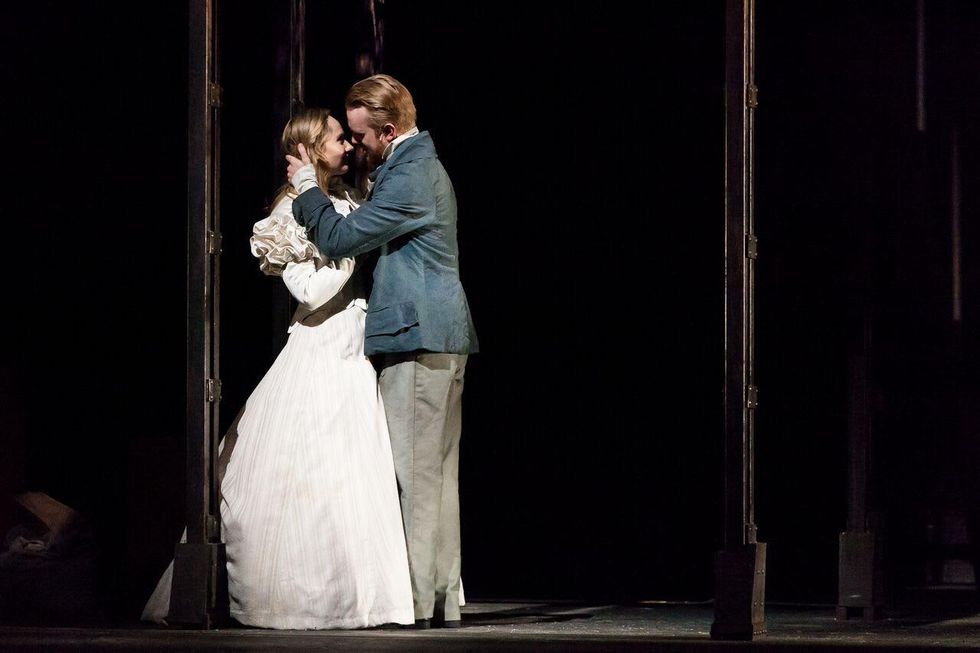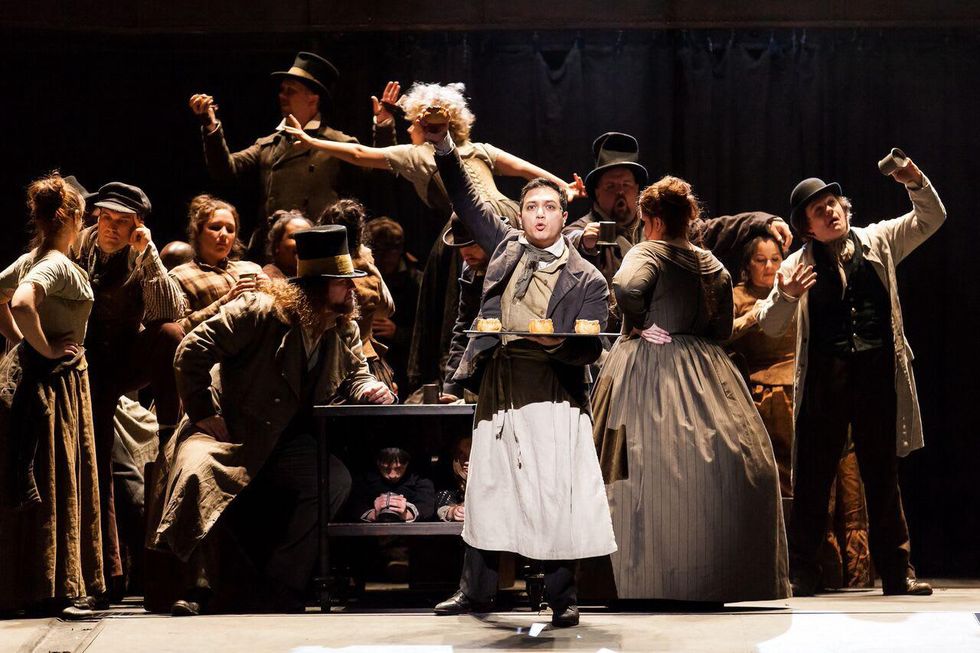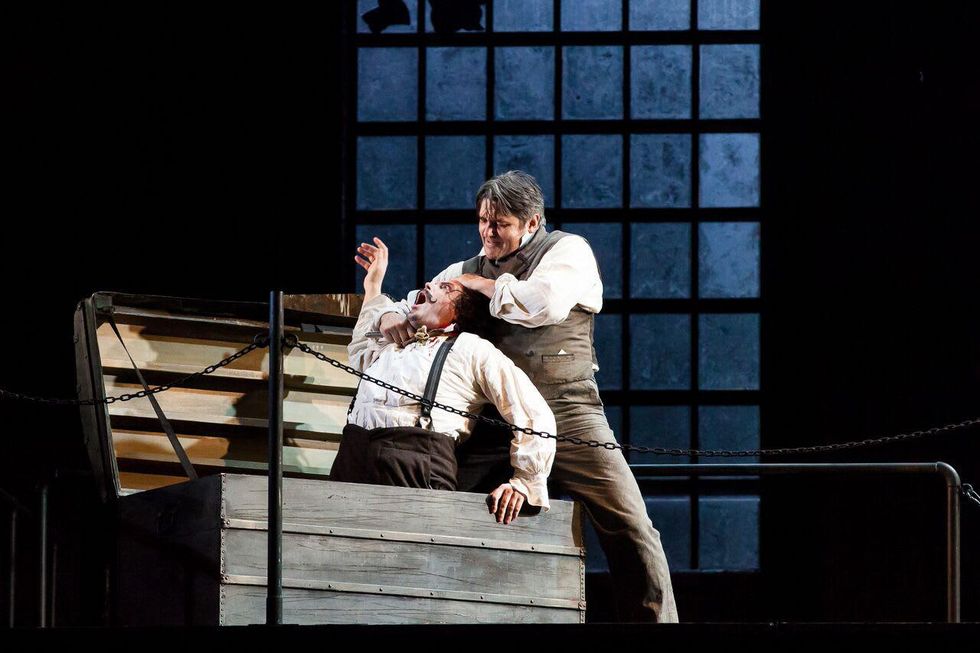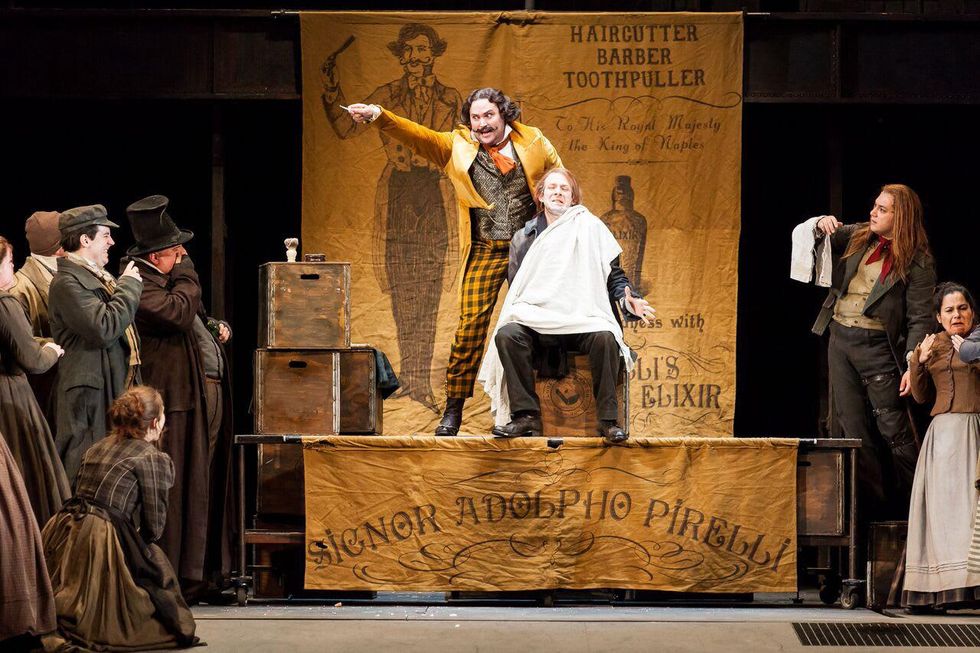The Review Is In
Sondheim music remains glorious, but HGO's production of Sweeney Todd is half-baked
Sweeney Todd has the perfect recipe for success. Start with an unjust judge and a betrayed barber who thirsts for revenge. Stir in sophisticated composition and scintillating lyrics by Stephen Sondheim, an extraordinary libretto by Hugh Wheeler, and a true operatic talent like baritone Nathan Gunn. Besides, you can't fail with a story in which humans are baked into pies to the delight of hungry London crowds.
So why did Houston Grand Opera's season-ending production feel so half-baked? Weak acting, poor timing, and technical problems didn't help. But to perform Sweeney Todd is to make beautiful music from the sweet and the horrible. Without the right harmony, it's just noise.
Besides, you can't fail with a story in which humans are baked into pies to the delight of hungry London crowds.
When Sondheim and Wheeler debuted their 1979 hit, they were not the first to visit this story. Sweeney Todd dates to the Victorian penny dreadfuls, serialized tales of gruesome goings-on. But their version became definitive largely due to Sondheim's memorable lyrics. Licks of "Johanna," "Pretty Women," and "Not While I'm Around" were no doubt hummed or sung before, during, and after the performance by an avid audience.
Sweeney Todd's story is equally memorable. Wronged barber, Benjamin Barker, was sentenced to a lifetime of hard labor in Australia by the nefarious Judge Turpin who desired Barker's beautiful and innocent wife Lucy. After imprisoning Barker, Turpin rapes Lucy and kidnaps and raises Barker's infant daughter, Johanna, as his ward who he'll later try to marry at the tender age of 16.
Barker returns as Sweeney Todd at the beginning of the opera. He is now a creature warped by injustice who sees his native city as an infernal sink: "There's a hole in the world like a great black pit / and the vermin of the world inhabit it / and its morals aren't worth what a pig can spit."
Kill The Whole World
When an initial attempt on the judge's life fails, he decides to kill indiscriminately. Sweeney Todd admits, more than once, he would happily kill the whole world. When he looks at the city he sees a pit but he hears the "crunching sound" of "man devouring man." To play Sweeney Todd is to make us feel any or all of us watching might be the next to be disposed of with a swift slice of his silver razor.
The exception was their rousing rendition of Sondheim's devious, "Little Priest" in which they imagine how pies baked of various men would taste.
Herein lies the first problem with HGO's production. Nothing was sweeter than hearing the incomparable Nathan Gunn sing "Pretty Women" or "Johanna." When last I saw Gunn on stage, he played the title role of Billy Budd at the Met. His voice is rich and deep but far-ranging and he excels at the sweet caramel tones wrapped in the gothic horror of the plot.
But Gunn may not quite possess the acting chops to pull off "the Demon Barber of Fleet Street." When he was to seem consumed by apocalyptic fervor he seemed loud, a bit angry and quite distracted.
Sweeney Todd depends on the devious Mrs. Lovett who recognizes him upon his return and helps direct his revenge. Carrying a torch for Todd doesn't stop her from figuring out she can improve her horrid pies with the flesh of Todd's victims. Susan Bullock proved a disappointing Mrs. Lovett, convincing neither as a singer nor an actor. Her singing, like her accent, was often strained and more importantly there was rarely chemistry between her and Gunn, which made their frequent scenes together feel sluggish and long.
The exception was their rousing rendition of Sondheim's devious, "Little Priest" in which they imagine how pies baked of various men would taste. Priests are fresh because they don't commit sins of the flesh. Grocers are green, vicars are thicker, tailors are paler, and butler's are subtler. Just as you think Sondheim can't think of any more of these professional puns, he finds a few more. Todd and Lovett collaborate here, partners in crime for the first and only time in the performance.
Sweetest parts
As a rule the sweetest parts of Sweeney Todd were the most successful. Morgan Pearse and Nicholas Phan offered standout performances of Anthony Hope and Tobias Ragg. Pearse plays perfectly the part of the tender youth struck by love at the first sight of Todd's daughter Johanna. His rendition of "Johanna," a song that recurs and is often shared with Sweeeny Todd, is at once tender and potent.
Little in the opera is as convincing as Phan is when sings the classic "Not While I'm Around."
Phan plays the sad orphan, passed to Mrs. Lovett from the charlatan barber Adolfo Pirelli played by the spirited Scott Quinn. Little in the opera is as convincing as Phan is when sings the classic "Not While I'm Around."
Sadly both Megan Samarin's Johanna and Cynthia Clayton's Beggar Women failed to impress. Samarin looked the part but her singing lacked clarity and she failed to make the transition from a caged and pampered young lady in love to a witness to horror and asylum-dweller in the second act. Contrary to popular opinion, twitching does not necessarily signify madness.
As a street woman alternating begging for alms and propositioning sailors, Clayton at first convinces but in the progress of the work we discover she is Lucy, the crazed wife of Sweeney Todd, who everyone thinks dead. She becomes the Cassandra-like figure who discovers Lovett and Todd's infernal work. No one heeds her warning but it's hard to blame them. When Sweeney Todd kills her in a fit of rage without realizing who she is, it's seems like just one more body on the charnel pile.
In spite of the excellent work of conductor James Lowe, whose firm hand kept both dynamics and tempos in excellent order, dramatic timing was often lacking. Technical problems added to this halting quality. Microphones cut in and out, which made some actors impossible to hear while others blared.
Perfectly styled
The production itself was well-chosen, especially Tanya McCallin's sets and costumes, which were perfectly styled to reveal a treacherous, gruesome and gritty city. Lee Blakeley's occasionally overwrought staging produced too many distracting and unconvincing tableaux. When the curtain opens on the second act and the citizens are enjoying Mrs. Lovett's human pies, they gorge in an orgy of artificial gestures more fitting for Cats than Sweeney Todd. The parade of patients from the insane asylum were more irritating than terrifying.
Sondheim is practically foolproof, so there were certainly pleasures to be had, but it struck me that while this Sweeney Todd was not nearly as successfully as HGO's divine A Little Night Music from last season. Let's cross our fingers for next season's Carousel.
Sweeney Todd depicts a debased world. Justice is nowhere to be found, making revenge seem especially sweet. People eat people. Sweeney Todd should leave us feeling like we're crawling out of a black pit, not politely applauding between songs and spurts of blood.





